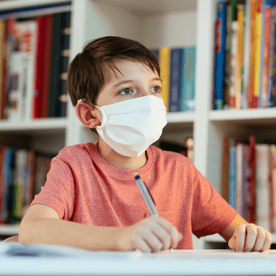There are many things people never tell you about parenting. For  instance, how many fingernails you’ll clip, or that you may have to tell your son to stop chasing his sister with moldy bread (okay that second one may be a “me” thing)...
instance, how many fingernails you’ll clip, or that you may have to tell your son to stop chasing his sister with moldy bread (okay that second one may be a “me” thing)...
However, the one quirk that we all were definitely not told about is that we’d have to parent through a pandemic. As many of us have discovered, there’s no handbook to refer to, everyone has different opinions, and the plan, whatever that may be, will inevitably change - frequently. With the return to school either here or around the corner, there are a million more questions than answers, and the few answers we’ve gotten seem to change overnight. This all adds up to an extremely stressful situation for everyone - parents, children, and educators - with seemingly no resolution in sight. However, there are some skills we can all work on to ease the discomfort. In this article, we're going to take a look at how two Executive Function (EF) skills can help parents beat the stress of going to back to school during these unpredictable times.
Emotional Regulation & Cognitive Flexibility
Emotional Regulation and Cognitive Flexibility are two powerhouse EF skills that can make tough situations more bearable. Both can help us relieve some stress and navigate through this unprecedented and overwhelming situation. Emotional regulation is how you experience, express, and manage your emotions, whereas cognitive flexibility is how you adapt your thinking and problem solving to new situations. Parents and kids can struggle with both of these areas, especially in times of stress. This dysregulation can manifest in big emotions like tantrums or outbursts of sadness or anger, or the opposite - withdrawing from situations to escape those strong feelings.
First Step: Determine the Why
To remedy this, it’s helpful to try and understand why we, or our children, are struggling. Reassessing both ourselves and our environment is a crucial first step. Are we all getting enough sleep, exercise, and water? Are we eating well? Is there something about our home that is stressful? Is it too cluttered? Is it too loud? Does each person have a space they can go to that’s quiet and as separate from others as possible? Taking the time to step back and assess our environment and behaviors can give us some insight into what’s causing our emotional dysregulation. We can use this insight to determine what needs to change and come up with some strategies to improve the situation.
How Flexible Thinking Can Help You Cope With Stress
It can feel nearly impossible to find the time to do this self-assessment and then incorporate new strategies and activities into our lives. We’re all stuck in the house together and as parents, we’re trying to work, parent, educate, clean, and take care of ourselves all at the same time. Cognitive flexibility, also known as flexible thinking, can really help in stressful situations by allowing us to become creative. Shifting our expectations by being flexible can be the key to finding solutions that work, especially in times of stress.
What are some ways to enact this flexible thinking? Here are a few things we may have to do:
- Exercise with our children.
- Modify our work schedules to accommodate others’ schedules.
- Skip watching another episode of a show to make sure we get enough sleep.
- Enlist the aid of all family members to keep clutter under control.
- Build a fort in the living room so an overwhelmed kid has a special place just for themselves.
- Take a diversion from a planned schedule in order to recharge.
- Create shorter to-do lists by focusing on One Big Thing for the day.
What Educators Want Parents to Know
Cognitive flexibility is also a critical skill for surviving major transitions, like going back to school in a pandemic. I reached out to some teachers to find out what they would love for parents to know about the school experience this year - and I'll bet their answers won't surprise you!
Along with safety for both teachers and children, cognitive flexibility was a common theme in their replies. They stressed the importance of working with our children to make sure they understand that school is going to be really different than it was before. They also emphasized the importance of making sure that we, as parents, understand that our expectations of our children’s academic experience need to be flexible, too. Changing our expectations will allow us to become partners with our children’s teachers instead of adversaries. As one teacher who is also a parent said, “Try to look at what your kid really needs and let the other stuff go.”
The Takeaway
Ultimately, we are all just doing our best with what we have. Adding some tools to your parenting toolbox  can help. Learning about Executive Function skills like emotional regulation and cognitive flexibility and the related steps you can take to improve those skills can make a big difference. When we learn these skills for ourselves, we can model them for our children. When our children see and hear us paying attention to our own emotional needs and practicing cognitive flexibility through empathy towards others, including our children’s educators, we will hopefully pass on the lessons we’ve learned about these important Executive Functions. Check out the resources below if you’d like to learn more.
can help. Learning about Executive Function skills like emotional regulation and cognitive flexibility and the related steps you can take to improve those skills can make a big difference. When we learn these skills for ourselves, we can model them for our children. When our children see and hear us paying attention to our own emotional needs and practicing cognitive flexibility through empathy towards others, including our children’s educators, we will hopefully pass on the lessons we’ve learned about these important Executive Functions. Check out the resources below if you’d like to learn more.
Additional Resources
Best of luck to you. It’s hard to be living through these challenging times - but you can do this and you’re certainly not alone!
 Our new infographic describes ways to shift your language, approaches, and how you measure success in order to communicate more effectively with your child - and reduce conflict at home.
Our new infographic describes ways to shift your language, approaches, and how you measure success in order to communicate more effectively with your child - and reduce conflict at home.

